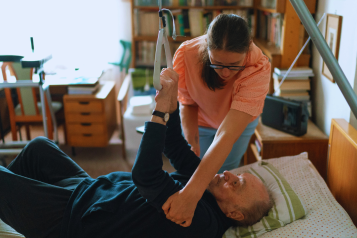How are people with sensory impairments coping in the pandemic?
The coronavirus crisis has thrown up big challenges for all of us. But how have the last few months been for people with sensory impairments - such as sight or hearing loss?
Here, Healthwatch Board member Frances Dewhurst urges people with sensory impairments to share their health, care and support experiences in our Covid-19 survey.
A hearing aid user and former director of local charity Cambridgeshire Hearing Help, Frances says it's really important to find out if people with sight or hearing loss have been able to get help for their health and the care and support they need.
She fears it may have impacted people's independence and confidence about going out. And, as services change, people may not have had accessible information in the right format.
Tell us about
-
Accessible information
Our survey wants to know if you've been able to get the information you need - in a format that works for you - to keep yourself safe during the crisis. -
Mental health and wellbeing
Have you felt more isolated or has your confidence been knocked? Has your independence been affected and how? -
Food, medicines and support
Have you been able to get the things you need or have you had help? Tell us how you've managed for shopping, for example. -
Service changes
Has a service you use changed or paused?
Have you been able to stay independent?
Have you been able to stay independent?
As lockdown eases, The Royal National Institute of Blind People (RNIB) is warning that blind and partially sighted people’s independence is increasingly under threat.
Last week, it highlighted how social distancing has turned the world "upside down" for blind and partially sighted people.
A lot of the strategies and tools people with sight loss use to get around safely – like being guided – are not allowed under current rules, and many have been left stranded.
Its own research shows:
-
Blind and partially sighted people are increasingly anxious about venturing out
-
Two out of three blind and partially sighted people feel less independent than before lockdown
Telephone and video communication is tiring
Have you been relying on telephone and internet communication with people?
Frances says it's tiring trying to follow the conversation and with lots of people talking. And it can be quite hard work if your hearing is not good enough to listen without a sense of strain.
Even with a good phone – an amplified one – if all your conversations are on the phone, that’s tiring as well.
Missing face to face communication?
Frances says she is missing talking to people face to face and being able to lip read and clearly see what they are saying.
She says it's really important to keep your hearing active.
"I’m lucky that I have friends and family to help me with that. But for people who are isolated, that must be very very challenging. If you rely only on the phone and people don’t speak clearly or slowly enough for you, or get impatient, it’s very challenging."
Lip reading and masks
When you can’t hear, you do rely very heavily on lip reading.
"We get about 30% of our understanding of sound through the shape of the mouth – but we all rely on lip reading to some extent, not just people with hearing loss," says Frances.
"So if people wear masks, you can’t see what they are saying -- and so it’s an added challenge for people.
"There has been more understanding about the difficulties for lip-readers and I hope that clear masks - where you can see people's mouths - will become more available.
"But in the meantime, seeing people in masks and not being able to lip read puts people off trying to get out and talking to people – it’s just another barrier you have to face. "
Tell us about your experience
Have you experienced any of these difficulties? Please tell us about your experiences.
Giving feedback, both good and bad, can help improve services.


